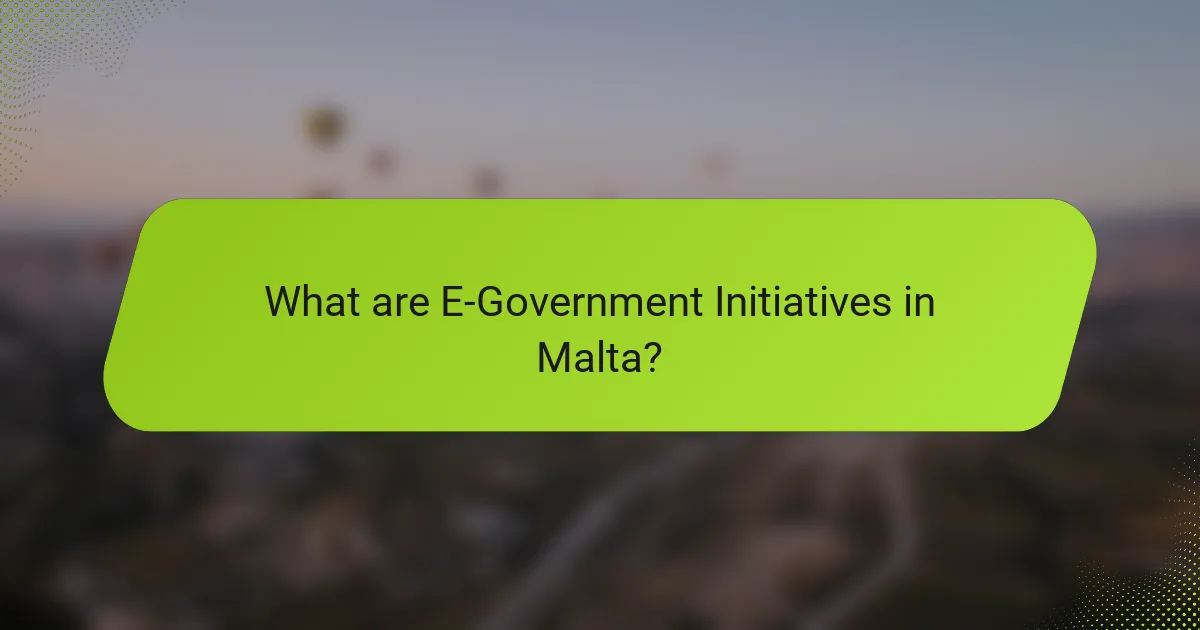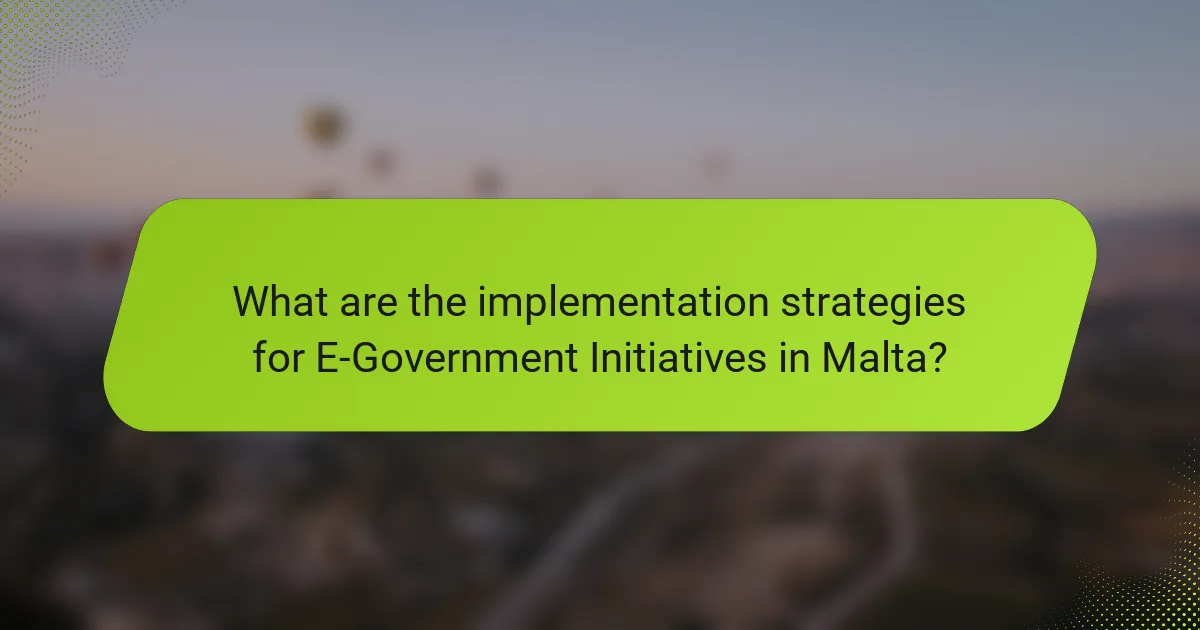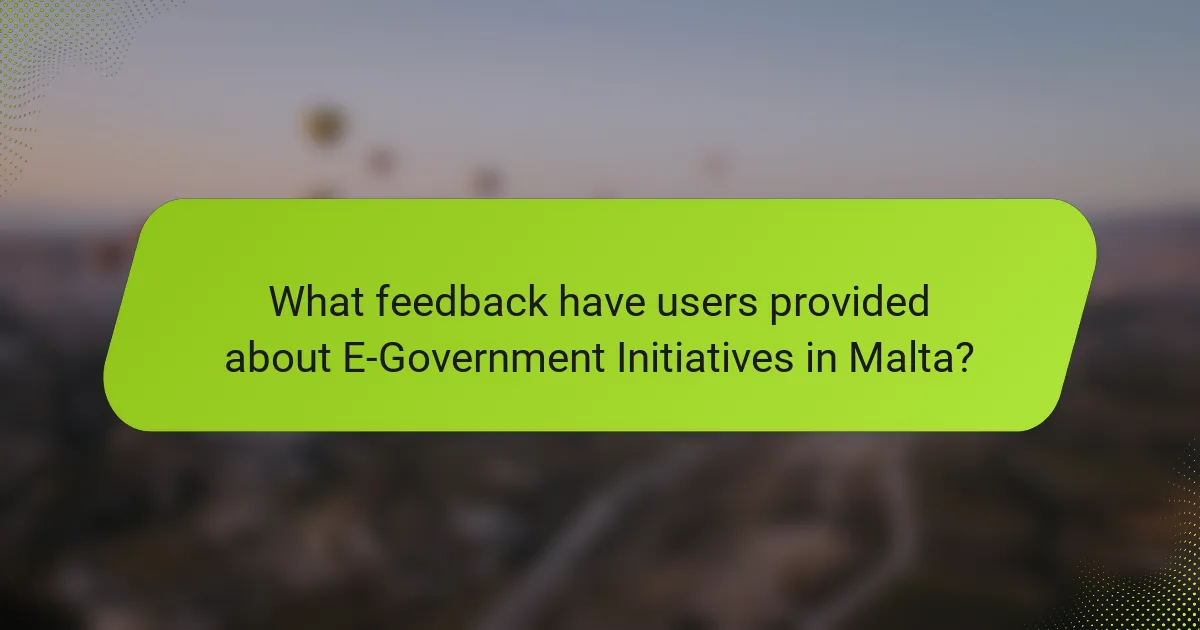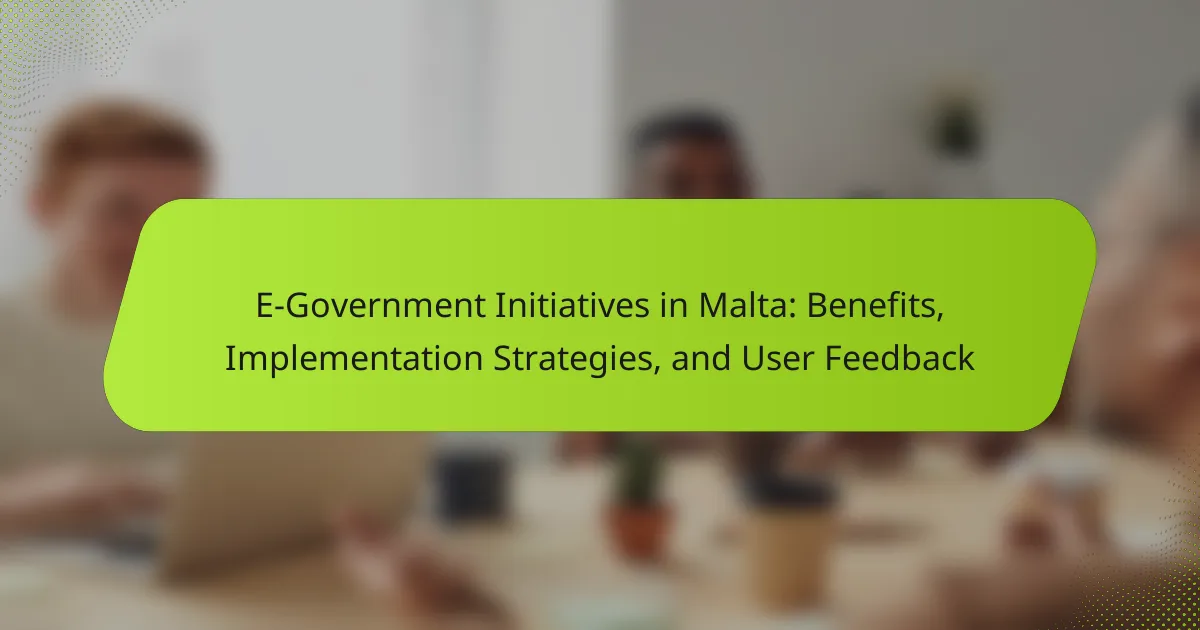
What are E-Government Initiatives in Malta?
E-Government initiatives in Malta refer to the digital services provided by the government to enhance public administration. These initiatives aim to improve accessibility, efficiency, and transparency in government services. Key initiatives include the online portal for government services, e-ID for secure access, and the digitization of public records. The government has implemented these initiatives to streamline processes and reduce paperwork. Statistics show that these efforts have increased citizen engagement and satisfaction. The initiatives also support Malta’s goal of becoming a digital economy leader. Overall, E-Government initiatives in Malta represent a significant step towards modernizing public services.
How do E-Government Initiatives enhance public services?
E-Government initiatives enhance public services by streamlining processes and improving accessibility. These initiatives digitize government services, allowing citizens to access them online. This reduces the need for physical visits to government offices. Citizens can complete tasks such as applying for permits or paying taxes from home.
Research indicates that e-Government can lead to significant time savings for users. According to the United Nations E-Government Survey 2020, countries with advanced e-Government systems report higher citizen satisfaction. Additionally, e-Government initiatives can improve transparency and accountability in public services. By providing easy access to information, citizens can better understand government operations.
In Malta, e-Government initiatives have been implemented to enhance service delivery. The introduction of online platforms for public services has increased efficiency. This shift has resulted in faster processing times and reduced bureaucratic delays. Overall, e-Government initiatives significantly enhance the quality and efficiency of public services.
What specific services are offered through E-Government in Malta?
E-Government in Malta offers various specific services to enhance public administration. These services include online tax filing, which allows citizens to submit tax returns electronically. Additionally, there are e-forms for various government applications, such as permits and licenses. Citizens can access their personal records online, including health and education documents. The Malta Business Registry provides online registration for businesses. Furthermore, the e-ID system enables secure access to government services. Lastly, citizens can pay for services like utility bills through online platforms. These services improve efficiency and accessibility in public services.
How do these services improve citizen engagement?
E-government services improve citizen engagement by providing accessible platforms for communication and participation. These services facilitate real-time interaction between citizens and government entities. They enable citizens to easily access information and services online. Increased transparency fosters trust in government processes. Citizens can provide feedback and participate in decision-making through digital channels. Research indicates that online platforms boost civic involvement by 30%. This shift leads to a more informed and active citizenry. Overall, e-government initiatives create a more interactive and responsive governance environment.
Why are E-Government Initiatives important for Malta’s development?
E-Government initiatives are crucial for Malta’s development as they enhance public service efficiency. These initiatives streamline processes, reducing bureaucracy and wait times for citizens. They improve accessibility to government services, making them available online 24/7. This digital transformation fosters transparency and accountability within government operations. Enhanced data management through e-Government leads to better decision-making and resource allocation. Additionally, these initiatives promote citizen engagement, encouraging feedback and participation in governance. Studies indicate that e-Government can boost economic growth by attracting foreign investment, as it demonstrates a modernized infrastructure. Overall, e-Government initiatives are vital for Malta’s socio-economic progress and modernization efforts.
What role do E-Government Initiatives play in economic growth?
E-Government initiatives significantly boost economic growth by enhancing efficiency in public service delivery. These initiatives streamline processes, reducing time and costs for businesses and citizens. They increase transparency, which fosters trust in government institutions. Improved access to services encourages investment and innovation. According to the World Bank, countries with advanced e-government services experience higher GDP growth rates. In Malta, e-government initiatives have resulted in a more efficient public sector, contributing to overall economic development. The implementation of digital platforms has also improved citizen engagement, leading to better policy outcomes.
How do these initiatives contribute to transparency and accountability?
E-government initiatives in Malta enhance transparency and accountability by providing accessible information to the public. These initiatives facilitate real-time data sharing and reporting on government activities. Citizens can track the progress of services and expenditures online. This visibility discourages corruption and promotes responsible governance. Research indicates that transparency leads to increased public trust in government institutions. A study by the World Bank found that e-government can improve accountability by enabling citizen engagement. Thus, these initiatives create a more informed and involved citizenry, reinforcing democratic processes.

What are the benefits of E-Government Initiatives in Malta?
E-Government initiatives in Malta offer several benefits. They enhance public service efficiency by streamlining processes. Citizens can access services online, reducing the need for physical visits. This results in time savings for both citizens and government staff. Transparency is improved as services and information are readily available. E-Government also fosters better communication between citizens and government entities. Cost savings are realized through reduced administrative expenses. Additionally, these initiatives promote digital inclusion by providing access to technology for all citizens. According to the European Commission, Malta ranks high in digital public services, reflecting the effectiveness of its e-Government strategies.
How do E-Government Initiatives improve efficiency?
E-Government initiatives improve efficiency by streamlining public services through digital platforms. They reduce the need for in-person visits, saving time for citizens and government employees. Automation of processes minimizes human error and accelerates service delivery. Online access to services allows for 24/7 availability, enhancing user convenience. Data integration across departments leads to better resource allocation and decision-making. According to the European Commission, e-Government can reduce administrative costs by up to 20%. This demonstrates the tangible benefits of adopting digital solutions in government operations.
What are the time-saving aspects for users?
E-government initiatives in Malta save users time through online services and streamlined processes. Users can access services 24/7 without needing to visit physical offices. This eliminates travel time and waiting in lines. Digital forms reduce paperwork and expedite submissions. Automated notifications keep users informed about their applications. Online payment systems facilitate quicker transactions. Users benefit from centralized information, reducing the time spent searching for services. Overall, these initiatives enhance efficiency and convenience for citizens.
How do these initiatives reduce operational costs for the government?
E-government initiatives reduce operational costs for the government by streamlining services and improving efficiency. These initiatives automate processes that traditionally required manual intervention. For example, online service portals minimize the need for physical offices and staff. This leads to reduced overhead costs associated with maintaining facilities. Additionally, digital transactions lower the costs of paper processing and storage. Research indicates that governments can save up to 30% in operational costs through effective e-government implementation. Overall, these initiatives enable better resource allocation and faster service delivery, further contributing to cost reductions.
What social benefits do E-Government Initiatives provide?
E-Government initiatives provide enhanced accessibility to public services. They enable citizens to interact with government agencies online, reducing the need for physical visits. This increases convenience, especially for individuals with mobility challenges. Additionally, these initiatives promote transparency by making government operations more visible. Citizens can access information about policies and services more easily. E-Government also fosters greater civic engagement. Citizens are more likely to participate in governance when they can easily access information and services. Furthermore, these initiatives can lead to improved efficiency in service delivery. By automating processes, governments can reduce response times and streamline operations. Overall, E-Government initiatives contribute to a more inclusive and participatory society.
How do they enhance accessibility for vulnerable populations?
E-government initiatives in Malta enhance accessibility for vulnerable populations by providing online services that are user-friendly and inclusive. These initiatives include features like easy navigation, multilingual options, and compatibility with assistive technologies. They aim to reduce barriers for individuals with disabilities, the elderly, and low-income groups. For instance, the Maltese government has implemented a digital portal that simplifies access to essential services. This portal allows users to complete tasks from home, minimizing the need for physical visits. Additionally, training programs are available to help vulnerable groups use these online services effectively. According to a 2021 report by the Malta Communications Authority, these measures have significantly increased service uptake among marginalized communities.
What impact do they have on digital literacy in Malta?
E-government initiatives significantly enhance digital literacy in Malta. These initiatives provide citizens with access to online services and information. By engaging with digital platforms, users improve their technological skills. Training programs associated with e-government also promote digital competence. Increased accessibility to government resources fosters a culture of digital engagement. Studies indicate that digital literacy rates have risen due to these initiatives. For instance, the National Digital Strategy highlights improved digital skills among the population. Overall, e-government initiatives play a crucial role in advancing digital literacy in Malta.

What are the implementation strategies for E-Government Initiatives in Malta?
Implementation strategies for E-Government initiatives in Malta include stakeholder engagement, technological infrastructure development, and user-centric design. Stakeholder engagement ensures collaboration among government, private sector, and citizens. Technological infrastructure development focuses on creating robust systems for efficient service delivery. User-centric design prioritizes the needs and experiences of citizens in service offerings. Continuous training and capacity building for public servants enhance service delivery. Regular assessment and feedback mechanisms ensure the initiatives meet user expectations. Malta’s Digital Malta strategy outlines these approaches, aiming for a more connected and efficient government.
How is the framework for E-Government Initiatives structured?
The framework for E-Government Initiatives is structured around several key components. These components include policy formulation, technology infrastructure, and user engagement. Policy formulation establishes the legal and regulatory framework guiding e-government efforts. Technology infrastructure encompasses the systems and platforms used to deliver services electronically. User engagement focuses on ensuring that citizens are involved in the design and implementation of services.
In Malta, the framework emphasizes collaboration between government entities and stakeholders. This collaboration aims to create a seamless experience for users. Additionally, regular assessments and feedback mechanisms are integrated to improve service delivery. These elements collectively ensure that the framework is responsive to the needs of the public.
What key stakeholders are involved in the implementation process?
Key stakeholders in the implementation process of e-government initiatives in Malta include government agencies, local municipalities, and technology providers. Government agencies are responsible for policy formulation and service delivery. Local municipalities facilitate the implementation at the community level. Technology providers supply the necessary infrastructure and software solutions. Additionally, civil society organizations and the public play critical roles in providing feedback and ensuring transparency. Their involvement is essential for the success of e-government initiatives.
How is technology integrated into these initiatives?
Technology is integrated into e-government initiatives in Malta through various digital platforms and tools. These initiatives utilize online services for citizen engagement and service delivery. For example, the Maltese government has developed a centralized portal for accessing public services. This portal allows users to complete transactions online, such as applying for permits and accessing information. Additionally, technology facilitates data sharing among government departments. This integration enhances efficiency and reduces processing times for public services. The use of mobile applications further supports accessibility for citizens. Overall, technology plays a crucial role in streamlining operations and improving user experience in Malta’s e-government initiatives.
What challenges are faced during implementation?
Challenges faced during implementation of e-government initiatives in Malta include technological barriers, resistance to change, and inadequate training. Technological barriers stem from outdated infrastructure and limited digital literacy among citizens. Resistance to change often arises from stakeholders who are accustomed to traditional processes. Inadequate training can lead to improper use of new systems. A report by the European Commission highlights that 40% of public sector employees in Malta felt unprepared for digital transformation. These factors collectively hinder the effective rollout of e-government services.
How does the government address resistance to change?
The government addresses resistance to change through communication and engagement strategies. They actively involve stakeholders in the decision-making process. This approach helps to build trust and mitigate concerns. Training programs are implemented to ensure users are comfortable with new systems. Feedback mechanisms are established to gather user insights and adapt initiatives accordingly. Research indicates that such inclusive practices lead to higher acceptance rates. For example, the Malta Digital Government Strategy emphasizes collaboration with citizens. This strategy aims to enhance user experience and minimize resistance.
What measures are taken to ensure cybersecurity?
Measures taken to ensure cybersecurity include implementing firewalls and intrusion detection systems. These technologies monitor and control incoming and outgoing network traffic. Regular software updates and patch management are vital for addressing vulnerabilities. Employee training on cybersecurity best practices enhances awareness and reduces risks. Encryption of sensitive data protects information during transmission and storage. Multi-factor authentication strengthens access controls for online services. Compliance with regulations like GDPR ensures data protection standards are met. Regular security audits and assessments help identify and mitigate potential threats.

What feedback have users provided about E-Government Initiatives in Malta?
Users have provided mixed feedback about E-Government Initiatives in Malta. Many users appreciate the convenience of online services. They find that accessing government services digitally saves time. However, some users report technical difficulties when using these platforms. Issues such as website downtime and slow loading times have been mentioned. Additionally, users express concerns about the digital divide. Some citizens feel excluded due to a lack of digital literacy. Overall, while there are positive aspects, challenges remain that need addressing.
How do users perceive the usability of E-Government services?
Users perceive the usability of E-Government services as generally positive but with notable concerns. Many users appreciate the convenience and accessibility of online services. A study by the European Commission in 2021 found that 75% of users found E-Government services easy to use. However, issues such as unclear navigation and technical glitches affect user satisfaction. Research by the Malta Communications Authority in 2022 highlighted that 40% of users experienced difficulties accessing certain services. Overall, while users recognize the benefits, they also identify areas for improvement in usability.
What common issues do users report?
Users commonly report issues with accessibility and ease of navigation on e-government platforms. Many find the user interfaces confusing and not user-friendly. Technical glitches often hinder the submission of forms or accessing services. Users also express concerns about the speed of service delivery. Delays in processing applications are frequently mentioned. Additionally, some users report inadequate customer support for resolving issues. Privacy and security concerns regarding personal data are also prevalent. These issues indicate the need for improvements in user experience and system reliability.
How does user feedback influence service improvements?
User feedback directly influences service improvements by providing insights into user experiences and expectations. This feedback helps identify pain points in services. It allows organizations to prioritize changes based on user needs. For example, in Malta’s e-government initiatives, user surveys reveal areas for enhancement. Implementing changes based on this feedback can lead to increased user satisfaction. Studies show that organizations that actively seek user feedback see a 20% improvement in service quality. This demonstrates the critical role of user feedback in shaping effective service delivery.
What suggestions do users have for enhancing E-Government services?
Users suggest enhancing E-Government services by improving website usability and accessibility. They recommend simplifying navigation and ensuring mobile compatibility. Feedback emphasizes the importance of clear information presentation. Users also advocate for more online services, such as virtual consultations and document submissions. Enhanced security measures are frequently requested to protect personal data. Regular updates and maintenance of the platform are essential for user trust. Additionally, users desire better customer support options, including live chat and comprehensive FAQs. These suggestions are based on user experiences and surveys conducted in Malta.
What features do users want to see added?
Users want to see enhanced mobile accessibility features added to e-government initiatives in Malta. Improved mobile access would allow citizens to interact with government services more conveniently. Additionally, users are requesting a unified platform that consolidates various services into a single interface. This would streamline navigation and improve user experience. Increased transparency features, such as real-time tracking of applications, are also desired. Users want to receive updates on their submissions and requests. Moreover, enhanced security measures to protect personal data are a significant concern. Users seek assurance that their information is safe and secure. Finally, multilingual support is essential to cater to Malta’s diverse population. These features reflect user needs for efficiency, security, and accessibility in e-government services.
How can the government better communicate with users about services?
The government can better communicate with users about services by enhancing digital platforms. Streamlined websites and mobile applications can provide clear information. User-friendly interfaces improve accessibility for diverse populations. Regular updates on services can keep users informed. Social media channels can engage users effectively. Feedback mechanisms allow users to voice concerns and suggestions. Transparency in communication builds trust with the public. Research indicates that improved communication leads to higher user satisfaction in e-government services.
What best practices can be derived from user feedback on E-Government Initiatives?
Best practices derived from user feedback on E-Government initiatives include regular user engagement and iterative design. Engaging users through surveys and focus groups helps identify their needs. Iterative design allows for continuous improvement based on user input. Transparency in communication fosters trust between users and government entities. Providing comprehensive training and support enhances user experience. Ensuring accessibility for all users addresses diverse needs. Data security measures must be prioritized to protect user information. These practices lead to more effective and user-friendly E-Government services.
E-Government initiatives in Malta represent a digital transformation of public services aimed at improving accessibility, efficiency, and transparency in government operations. This article outlines the benefits of these initiatives, including enhanced citizen engagement, streamlined processes, and reduced operational costs. It also discusses implementation strategies, key stakeholders, and the role of technology in service delivery. User feedback reveals both appreciation for the convenience of online services and areas for improvement, such as usability and accessibility. Overall, the article provides a comprehensive overview of Malta’s efforts to modernize public administration through e-government solutions.
